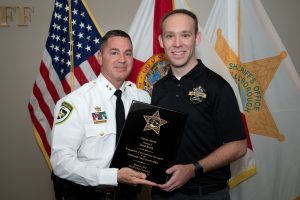Suicide Training for 911 Dispatchers Earns Psychology Professor Recognition From Sheriff

A four-hour course designed to help 911 dispatchers talk with individuals threatening suicide recently earned a UCF faculty member recognition from the Hillsborough County Sheriff’s Office.
Psychology Assistant Professor David Rozek, Ph.D., was given the 2022 Citizens Award for the work developed through his expertise in suicide prevention and post-traumatic stress disorder.
“Dispatchers have been giving us great feedback on the program,” said Rozek. “They love it because it fills a gap in their telecommunications training. Even with ample training, getting a call from someone about to end their life is something exceedingly difficult to deal with mentally.”
The project began in January 2020 and was implemented earlier this year. Rozek’s ultimate goal is to push for the program to become a part of the core training in emergency telecommunication centers across Florida.
The program is designed as a 4-hour course that aims to dispel the stigmas surrounding suicide and better assist those that call 911 experiencing suicidal ideation.
Emergency operators are typically trained to meet these calls with a series of yes or no questions. Rozek points to his training course as a chance to humanize this process by providing dispatchers with the tools to talk someone in a highly emotional state out of harming themselves.
“There was a lot of anxiety around what you should or should not say to someone in crisis as a 911 operator,” said Rozek. “Our training really focused on providing some background knowledge on suicidality and tangible skills when talking to someone in crisis. We want telecommunicators to feel comfortable being human with people that are in a highly emotional state of mind.”
The creation of the program was inspired by a ripple effect, points Rozek, who notes that teaching dispatchers how to interact with suicidal individuals can be the make or break between life or death.
Suicide is the second leading cause of death for those aged 10-34 according to Cleveland Clinic’s Behavioral Health Institute. Knowing how to talk to someone experiencing heightened emotions and dysregulation can change the outcome of this statistic, adds Rozek.
“I’ve been able to see my research come to life and actually help people, so that’s a really special feeling,” said Rozek. “As scientists, we dream of making an impact with our research. To be able to see it being directly applied in a real-world situations such as this is an incredibly gratifying feeling.”
